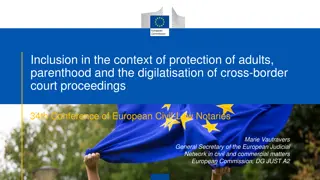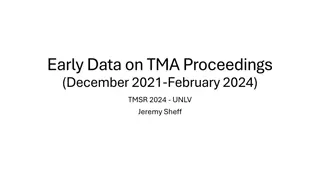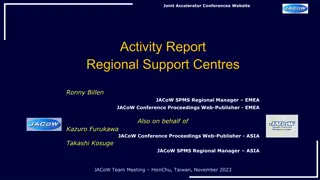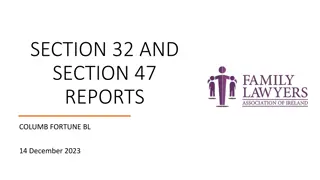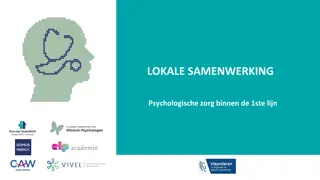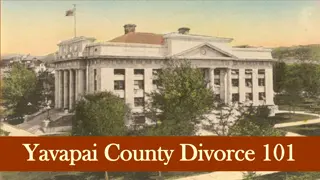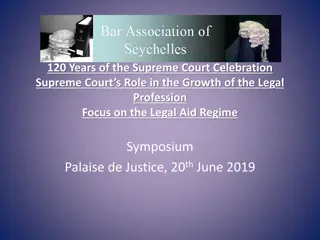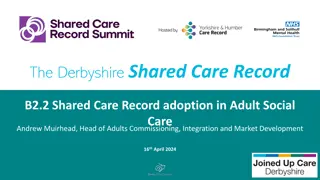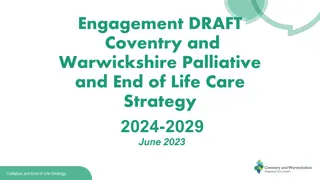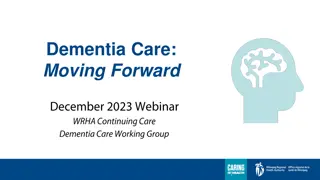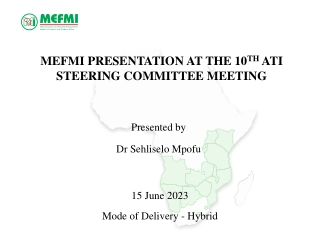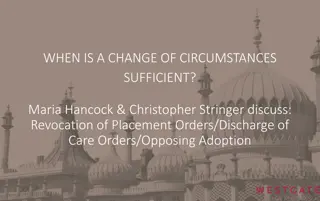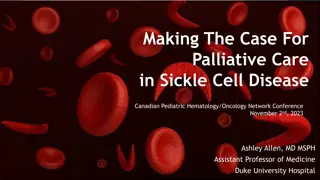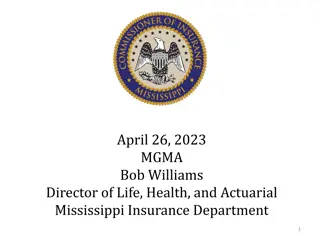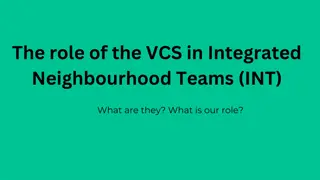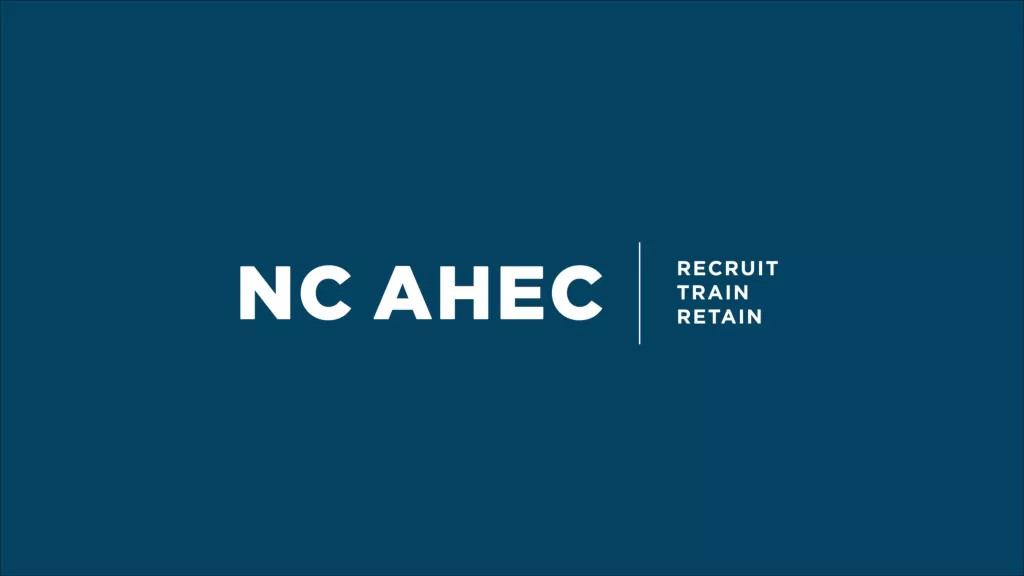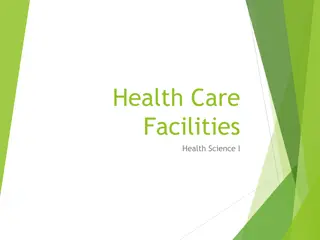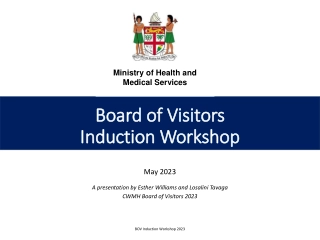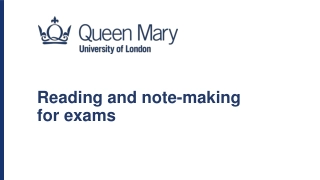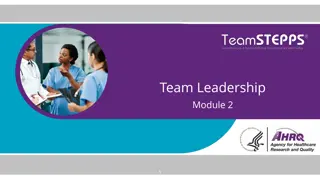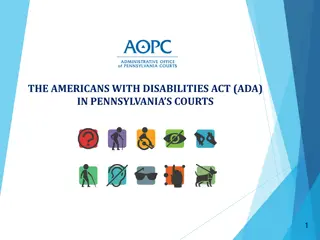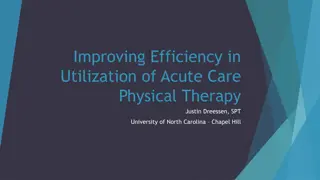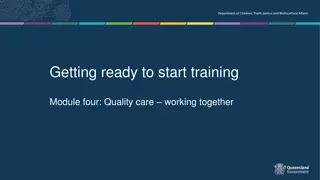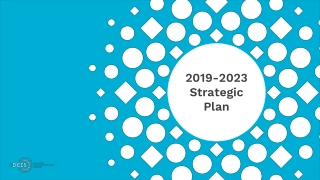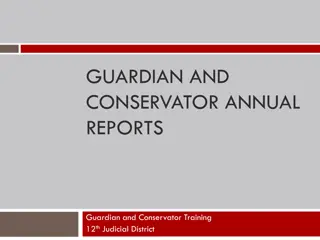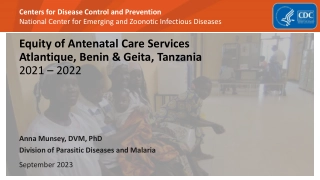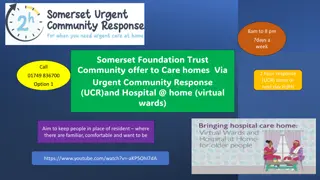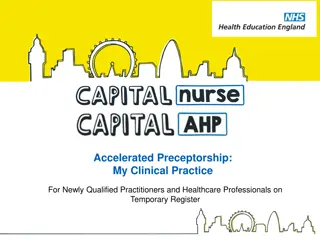Enhancing Collaboration in Children's Court Care Proceedings: Practice Note 17
This document discusses the designated agencies involved in Children's Court care proceedings, focusing on the transfer of case management from DCJ to NGOs, ethical issues, and the importance of collaboration. It introduces Practice Note 17, outlining guidelines for sharing information, improving decision-making processes, and ensuring the best interests of children are prioritized.
Download Presentation
Please find below an Image/Link to download the presentation.
The content on the website is provided AS IS for your information and personal use only. It may not be sold, licensed, or shared on other websites without obtaining consent from the author. Download presentation by click this link. If you encounter any issues during the download, it is possible that the publisher has removed the file from their server.
Presentation Transcript
Childrens Court Practice Note 17 Designated agencies in Children s Court care proceedings Presented by Jane Smith, Principal Solicitor, Care Legal
2 CMT Case management transfer from DCJ to NGO designated agencies has been occurring since 2012 following recommendations of the Special Commission of Inquiry into Child Protection Services (16.1, 16.2) that most children and young people should be supported by DCJ retaining parental responsibility and a NGO being responsible for case management, placement and casework services. Permanency Support Program (PSP, commenced 1 July 2018) and the Permanency Case Management Policy (PCMP) was developed to support CMT in the OOHC system. The PCMP stresses that DCJ and the NGO apply a sharp focus on collaboration in decision making during court proceedings and clarifies roles and responsibilities during care proceedings. CMT often occurs before final orders are made. NGOs often have primary case responsibility during section 90 proceedings if a child or young person is in long-term OOHC.
3 Issues with CMT during care proceedings Ethical issues with affidavit writing for DCJ Caseworkers. Quality of evidence and lack of evidence being presented to the Court by DCJ Model Litigant requirements. Disclosure of high level identification information in Court documents. Little or no notice to NGO witnesses being required to provide evidence (via affidavits or through cross-examination). Lack of consultation between DCJ and NGOs when making decisions about restoration, permanency goal, placement, contact, etc. Lack of information provided to NGOs about what happens at Court. NGOs not being included in the Dispute Resolution Conference. NGOs not receiving Court documents, including CCC report.
4 Introducing Practice Note 17 First issued on 2 December 2022, amended on 20 March 2023. Applies where an NGO designated agency has primary case responsibility for the subject child or young person. Acknowledges that NGOs can provide the Court with information that will improve decisions for children. The purpose is to: Ensure the Children s Court has the best available evidence when making decisions regarding the care and protection of children. Identify the processes for NGOs to access evidence filed in proceedings, provide relevant information to the Court and to contribute to Court proceedings (where the NGO is not a party)
5 Providing information to NGO Within 14 days of CMT to NGO, DCJ is to file and serve a Notice of Transfer of primary case responsibility to a Designated Agency and confidentiality statement (Form 47). The Notice includes name of the NGO and contact information for the NGO Caseworker and Manager. Confidentiality agreement is required between DCJ and the NGO that protects the confidentiality of the information provided to the NGO.
7 Providing information to NGO After Notice is filed, other parties have 5 working days to file and serve a Notice of objection. DCJ is to provide the NGO with copies of any document filed (except for CCC reports and expert reports) no earlier than the 5 working days and no later than 10 working days after the Notice is served. NGO should continue to receive filed documents during proceedings. Parties can object to particular documents being provided to the NGO during proceedings with the Court dealing with the objection.
8 Providing information to NGO At the time of release of a CCC report (usually in Chambers), the Court is to determine whether to release the CCC report to the NGO. If a CCC report is not released to the NGO, DCJ can seek approval of the Court to provide the CCC report to the NGO. Within 3 days of each court event, DCJ is to inform the NGO of the directions, orders and any judicial comments about the matter. After matter is finalised, DCJ can request access to Court documents on behalf of the NGO DCJ can seek approval of the Court for the NGO to receive a copy of the transcript by notifying the parties and filing a request with the Court.
9 NGO involvement during care proceedings Preparing affidavits which are filed in the DCJ case. NGO is not to file affidavit directly with the Court, if not a party. The Court or a party can request an NGO representative to attend Court. The presiding judicial officer retains discretion to determine whether the NGO representative is to attend all or part of the proceedings. DCJ to notify the NGO of DRC date within 7 days of the DRC date being set. Children s Registrar determines who will be invited to a DRC although NGO will ordinarily be invited (PN 3, clause 4.2 a representative of an NGO authorised by the Secretary to case manage the placement of the child or young person ).
10 NGO involvement during care proceedings DCJ is to ascertain availability of NGO witnesses prior to hearing date being set. Once hearing date is set, DCJ is to notify the NGO of the hearing date and who will be required as witnesses. Joinder applications (s 98(3), Care Act) Seeking to be heard on matters that have a significant impact on NGO where NGO is not a party (s 87, Care Act)
11 Further NGO involvement during care proceedings Signing the Summary of Proposed Plan. Briefing experts in the preparation of expert reports. Consultation during Care Plan development and inclusion of NGO views. Assisting children and young people to speak/meet with their lawyers (ILR or DLR). Assisting family members, carers and proposed guardians, to access legal advice. Section 82 reports and provision of information during section 82 progress reviews. Birth Certificates.



